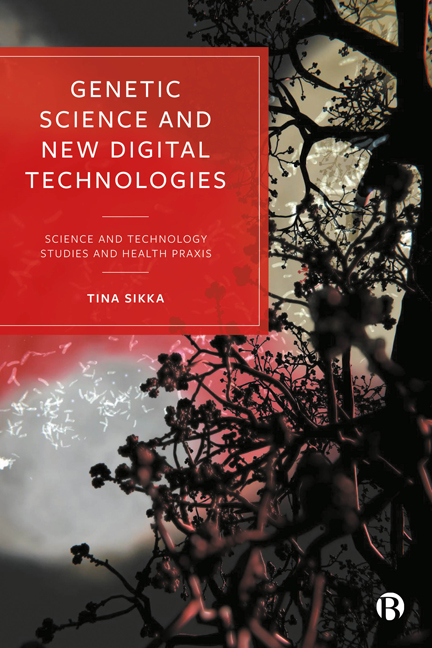Book contents
- Frontmatter
- Contents
- Notes on Contributors
- Introduction
- 1 Social and Behavioural Genomics and the Ethics of (In)Visibility
- 2 PureHealth: Feminist New Materialism, Posthuman Auto-Ethnography and Hegemonic Health Assemblages
- 3 Ambivalent Embodiment and HIV Treatment in South Africa
- 4 An ‘Artificial’ Concept as the Opposite of Human Dignity
- 5 Health Praxis in the Age of Artificial Intelligence: Diagnostics, Caregiving and Reimagining the Role(s) of Healthcare Practitioners
- 6 Digital Health Technological Advancements and Gender Dynamics in STS
- 7 Automation in Medical Imaging: Who Gets What AI Sees? Insights from the Adopters’ Perspective
- 8 Robots for Care: A Few Considerations from the Social Sciences
- 9 Are Ovulation Biosensors Feminist Technologies?
- Conclusion
- Index
1 - Social and Behavioural Genomics and the Ethics of (In)Visibility
Published online by Cambridge University Press: 28 March 2024
- Frontmatter
- Contents
- Notes on Contributors
- Introduction
- 1 Social and Behavioural Genomics and the Ethics of (In)Visibility
- 2 PureHealth: Feminist New Materialism, Posthuman Auto-Ethnography and Hegemonic Health Assemblages
- 3 Ambivalent Embodiment and HIV Treatment in South Africa
- 4 An ‘Artificial’ Concept as the Opposite of Human Dignity
- 5 Health Praxis in the Age of Artificial Intelligence: Diagnostics, Caregiving and Reimagining the Role(s) of Healthcare Practitioners
- 6 Digital Health Technological Advancements and Gender Dynamics in STS
- 7 Automation in Medical Imaging: Who Gets What AI Sees? Insights from the Adopters’ Perspective
- 8 Robots for Care: A Few Considerations from the Social Sciences
- 9 Are Ovulation Biosensors Feminist Technologies?
- Conclusion
- Index
Summary
Introduction
The postgenomic era – the period following the completion of the Human Genome Project in 2003 – ushered in rapid technological advancements and significantly reduced the costs of DNA sequencing. From genetic matchmaking services (Michels-Gualtieri and Appel, 2020) and in vitro fertilization for complex behaviours and traits (Orchid, nd), to direct-toconsumer genetic testing for behaviours and outcomes such as maths ability, depression and intelligence (GenePlaza, nd), genetic thinking is infiltrating countless aspects of public life. The growing accessibility of genomic data raises both possibilities (Harden, 2021a) and concerns (Roberts and Rollins, 2020) about the integration of molecular genetic data into society and public policy. It is transforming how individuals and communities think about themselves and others such that life is increasingly ‘understood, and acted upon, at the molecular level’ (Rose, 2007, p 5).
In the face of the DNA revolution, this chapter utilizes the theoretical framework of discriminate biopower (Fullwiley, 2004) to examine the forms of sociopolitical (in)visibility that may be crafted, upgraded or deleted in public education by contemporary research in social and behavioural genomics. Social and behavioural genomics examines how genetic differences between humans link to differences in behaviours and socioeconomic outcomes (Harden and Koellinger, 2020). While genetics have long captured the popular imagination, social and behavioural genomics is critically reimaging two aspects of our world today. First, how we relate our material, embodied selves, and second, the ways in which power and inequality are reflected and reproduced.
In building upon critical Science, Technology and Society scholarship on the relationship between genetics and society (for example, Duster, 2005; Bliss, 2013; Roberts, 2015; Panofsky, 2018), this chapter offers a critical interrogation of the sociotechnic imaginaries manufactured by social and behavioural genomics. It does so by exploring how potential applications of social and behavioural genomics to education might reaffirm or make new past, present and future (in)visibilities and inequalities, and feed into normative notions of who is ‘healthy’ and ‘able’. These inequalities manifest themselves in the differential investment researchers, policy makers and societies give to support the health and wealth of individuals and collectives within public education. For example, this chapter explores how predictive applications of genomics to education research, policy and systems, including the idea of precision education, might map out sociotechnic futures in which students are tracked and streamed: (1) in the name of bio-molecular transformation; and (2) under the neoliberal guise of individualization, personalization and optimization.
- Type
- Chapter
- Information
- Genetic Science and New Digital TechnologiesScience and Technology Studies and Health Praxis, pp. 9 - 27Publisher: Bristol University PressPrint publication year: 2023



